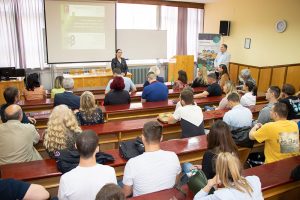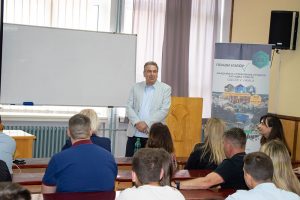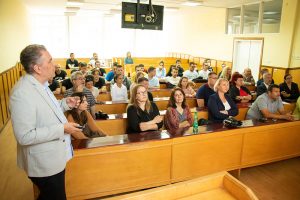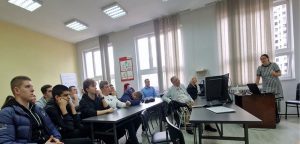Topic:
“Exploring Opportunities and Challenges of Networking Among Higher Education and Research: Research Data as Machine Learning Educational Tasks”.
Short description:
Тhe results of the Workshop with the topic “Application of machine learning in the framework of academic and vocational studies”, held in the period from 14th to 16th of December 2022. at the Western Serbia Academy of Vocational Studies (WSAVS) will be presented during the round table. Then the experiences in the application of machine learning in research, teaching and project activities at high educational institutions will be discussed. Frameworks of cooperation based on the transfer of valuable sets of experimental and theoretical data obtained at the Institutes to the Academy will be proposed, on the basis of which machine learning tasks will arise as a part of the solution of real problems.
Participants:
- Members of the Department of Information Technologies WSAVS,
- Dragan Markushev, PhD, Full Research Professor, Institute of Physics – National Institute of thе Republic of Serbia, University of Belgrade,
- Aleksandar Kupusinac, PhD, Full Professor, Faculty of Technical Sciences, University of Novi Sad
- Dragana Markushev, PhD, Assistant Research Professor, Institute of Physics – National Institute of thе Republic of Serbia, University of Belgrade,
- Marica Popovic, PhD, Assistant Research Professor, Institute of Physics – National Institute of thе Republic of Serbia, University of Belgrade,
- Slobodanka Galovic, PhD, Full Research Professor, Vinca Institute of Nuclear Sciences – National Institute of thе Republic of Serbia, University of Belgrade,
- Katarina Djordjevic, PhD, Assistant Research Professor, Vinca Institute of Nuclear Sciences – National Institute of thе Republic of Serbia, University of Belgrade,
- Miojub Nesic, PhD, Assistant Research Professor, Vinca Institute of Nuclear Sciences – National Institute of thе Republic of Serbia, University of Belgrade,
- Zarko Cojbasic, PhD, Full Professor, Faculty of Mechanical Engineering, University of Niš, Member of Executive Committee of IEEE for Serbia and Montenegro Section and Chairman of Computational Intelligence Chapter of IEEE Serbia and Montenegro Section.
- Dragan Pantic, PhD, Full Professor, Faculty of Electronic Engineering University of Nis,
- Sanja Aleksic, PhD, Assistant Professor, Faculty of Electronic Engineering University of Nis,
- Mladena Lukic, PhD, Assistant Professor, Faculty of Occupational Safety, University of Nis,,
- Emilija Kisic, PhD, Assistant Professor, Faculty of Information Technology, University of Metropolitan Belgrade
- Interested teacher stuff of WSAVS
- Interested participants of SED 2023
Moderators of the Round table:
- Dragan Markushev, PhD, Full Research Professor, Institute of Physics – National Institute of thе Republic of Serbia, University of Belgrade,
- Aleksandar Kupusinac, PhD, Faculty of Technical Sciences, University of Novi Sad
- Miroslava Jordovic Pavlovic, PhD, Professor of Vocational Studies of Western Serbia Academy of Vocational Studies and Assistant Professor, Faculty of Information Technology, University of Metropolitan Belgrade





